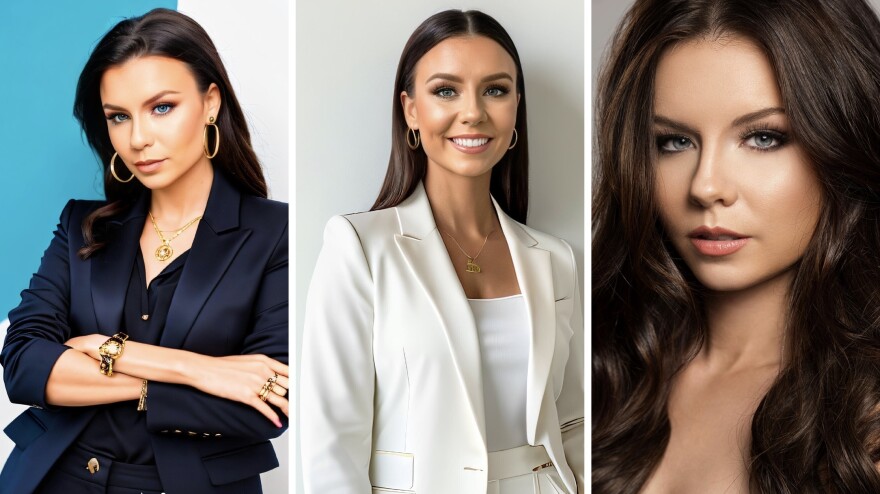Sophia Jones is juggling a lot right now. She just graduated from her master's program, started her first full-time job with SpaceX and recently got engaged. But thanks to technology, one thing isn't on her to-do list: getting professional headshots taken.
Jones is one of a growing number of young professionals who are relying not on photographers to take headshots, but on generative artificial intelligence.
The process is simple enough: Users send in up to a dozen images of themselves to a website or app. Then they pick from sample photos with a style or aesthetic they want to copy, and the computer does the rest. More than a dozen of these services are available online and in app stores.
For Jones, the use of AI-generated headshots is a matter of convenience, because she can tweak images she already has and use them in a professional setting. She found out about AI-generated headshots on TikTok, where they went viral recently, and has since used them in everything from her LinkedIn profile to graduation pamphlets, and in her workplace.
So far no one has noticed.
"I think you would have to do some serious investigating and zooming in to realize that it might not truly be me," Jones told NPR.
Still, many of these headshot services are far from perfect. Some of the generated photos give users extra hands or arms, and they have consistent issues around perfecting teeth and ears.
These issues are likely a result of the data sets that the apps and services are trained on, according to Jordan Harrod, a Ph.D. candidate who is popular on YouTube for explaining how AI technology works.
Harrod said some AI technology being used now is different in that it learns what styles a user is looking for and applies them "almost like a filter" to the images. To learn these styles, the technology combs through massive data sets for patterns, which means the results are based on the things it's learning from.
"Most of it just comes from how much training data represents things like hands and ears and hair in various different configurations that you'd see in real life," Harrod said. And when the data sets underrepresent some configurations, some users are left behind or bias creeps in.
Rona Wang is a postgraduate student in a joint MIT-Harvard computer science program. When she used an AI service, she noticed that some of the features it added made her look completely different.
"It made my skin kind of paler and took out the yellow undertones," Wang said, adding that it also gave her big blue eyes when her eyes are brown.
was trying to get a linkedin profile photo with AI editing & this is what it gave me 🤨 pic.twitter.com/AZgWbhTs8Q
— Rona Wang (@ronawang) July 14, 2023
Others who have tried AI headshots have pointed out similar errors, noticing that some websites make women look curvier than they are and that they can wash out complexions and have trouble accurately depicting Black hairstyles.
"When it comes to AI and AI bias, it's important for us to be thinking about who's included and who's not included," Wang said.
For many, the decision may come down to cost and accessibility.
Grace White, a law student at the University of Arkansas, was an early adopter of AI headshots, posting about her experience on TikTok and attracting more than 50 million views.

Ultimately, White didn't use the generated images and opted for a professional photographer to take her photo, but she said she recognizes that not everyone has the same budget flexibility.
"I do understand people who may have a lower income, and they don't have the budget for a photographer," White said. "I do understand them maybe looking for the AI route just to have a cheaper option for professional headshots."
Copyright 2023 NPR. To see more, visit https://www.npr.org.


